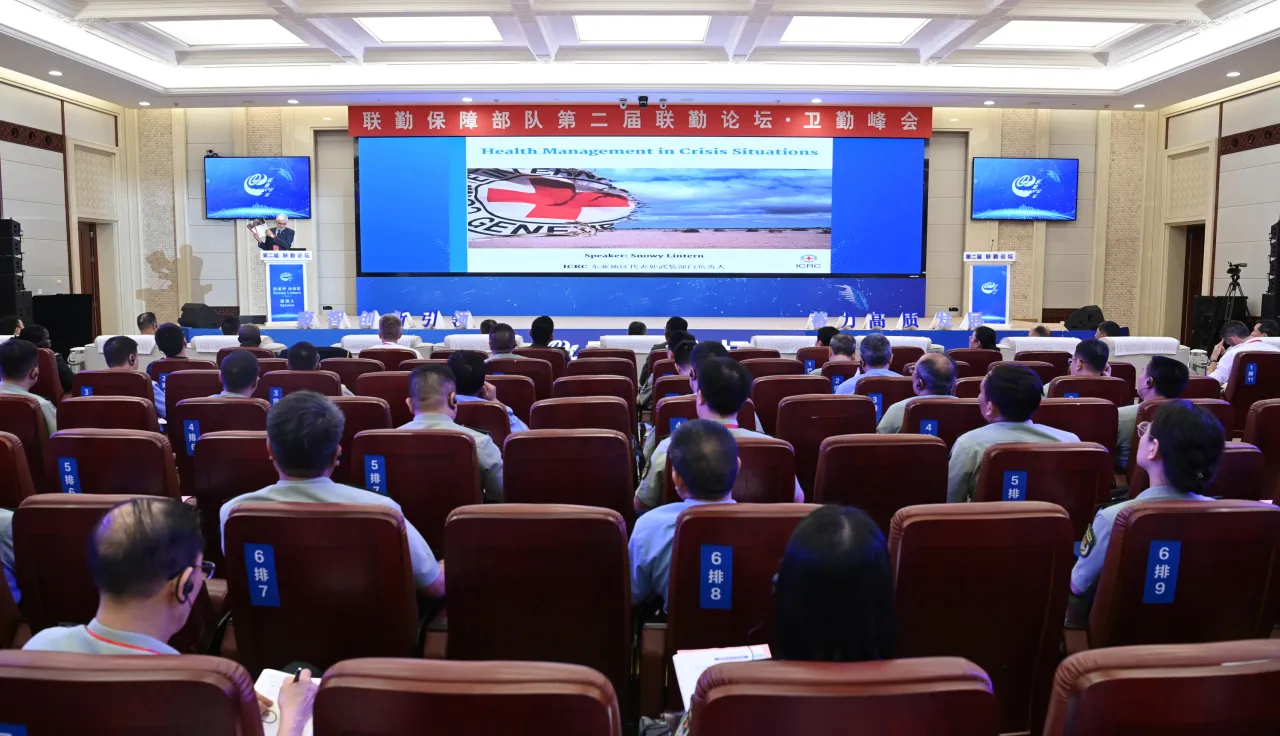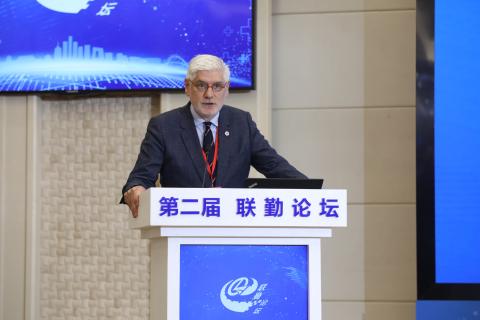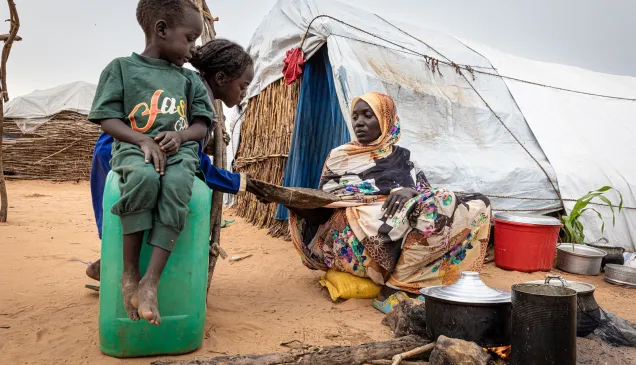China: Health interventions in crisis situations

On July 4, Snowy Lintern, delegate to the Armed Forces of the ICRC's Regional Relegation for East Asia, was invited to attend the second Joint Logistic Forum Medical Service Summit held by the Chinese People’s Liberation Army in Beijing and delivered a speech themed on “Health Interventions in Crisis Situations”.
Ladies and Gentlemen,
Thank you for the opportunity to speak with you today at the Joint Logistic Forum – Medical Service Summit. Thank the organizers…The ICRC has a long and fruitful relationship with the PLA including on medical matters, with joint interest in war surgery training and pre-deployment training.
As we gather here, it is vital to acknowledge the increasing polarization and instability that characterize our world today. This reality demands robust, adaptive responses from the humanitarian sector to meet the needs of affected populations. The proliferation of violence and armed conflicts – there are more than 120 armed conflicts today - is exacerbated by the impact of climate change and other global threats, and poses unprecedented challenges.
Medical facilities and healthcare professionals are being targeted, leaving civilians without protection.
The humanitarian consequences extend far beyond immediate injuries and violent deaths as high numbers of civilians succumb to disease outbreaks and non-communicable diseases (NCDs) due to the disruption of medical care and health system infrastructure, food insecurity and climate shocks.
The International Committee of the Red Cross (ICRC) is a humanitarian organization mandated to protect and assist civilians in the world's most fragile and conflict-affected regions.
Today, we will present the organization’s comprehensive approach to health interventions and life-saving operations in conflict zones, using illustrations from some contexts to highlight aspects that we consider relevant in relation to “care under fire” and other topics of this forum.
We will outline our strategies for delivering rapid, effective, and collaborative medical care and additionally detail our methodologies for building, managing, and operating field operations, including field hospitals in challenging and volatile environments.
Understanding the Health System in Crisis Situations
When a crisis occurs, it can cause widespread panic among the population and confusion among responders. For the ICRC, having a good knowledge of the health systems in the regions where we operate is a continuous process, not merely a reactive measure due to an acute crisis.
The coordination with Ministries of Health (MoH) and other competent authorities can ensure that operational decisions can receive the necessary support and permissions and can be translated into immediate actions.
The assessment of core aspects, capacities, coping mechanisms, and resilience of the local health system is carried out in parallel with the mapping of health-related actors, activities, locations, capacities, and supply chains. Key health structures for referrals are identified, as this is crucial to establish emergency medical services and first aid posts.
In any crisis, documenting available supply stocks for immediate response is essential. This includes evaluating the feasibility of reallocating projects, programs, and material resources according to the needs. Available human resources and their skills are also evaluated, determining the potential for reassigning them to priority tasks during the first phase of the response and subsequent periods.
A focal point for data collection, management and reporting is designated, ensuring that data-gathering systems are robust and operational. Geographic Information Systems (GIS) are also employed for enhanced data visualization and analysis, supporting our decision-making processes.
Examples of ICRC health response during crisis
The ICRC relies on 6 health core activities that can be mixed and combined according to the needs and specific priorities identified on the ground.
Adopting the public health pyramid is critically important, because beyond violent deaths and injuries, most of war victims (notably civilians) suffer from and die because of the indirect health consequences of the conflict (disruption of the health system, discontinuity of care and non-communicable diseases, outbreaks, malnutrition, mother&child morbidity/mortality). Therefore, a public health approach in the response is crucial.
We also need to consider that contemporary armed conflicts are protracted and can cause long humanitarian crises, up to decades in many cases (Somalia, Afghanistan, Syria, DRC, Myanmar, IL/OT). In terms of response, a short-term and lifesaving thinking to assist the most vulnerable should be combined with ensuring continuity of care, health system strengthening, and long-term structural interventions.
During the brutal war in Tigray, Ethiopia, in the period 2020-2022 emergency services were provided at Shire Hospital. After the signing of a peace agreement, Tigray is now relatively calm, however the devastating consequences of the conflict persist. This results in high rates of mental and psychosocial disorders, high needs of post-trauma reconstructive surgery and orthopedic rehabilitation. In this context, the ICRC provides services and addresses ongoing health needs in primary health care (PHC), by ensuring general outpatient consultations and antenatal care, and increasing the access to essential health services to the population.
In other regions of Ethiopia (Amhara and West Oromia), armed violence and localized conflict(s) continue. These regions are inaccessible to the regional and local health authorities or other humanitarian actors, except for the ICRC. Our medical operation supports hospitals and PHC centers, as to ensure continuity of care also for pregnant women and girls in case of complicated pregnancies and deliveries, of severely sick children, survivors of sexual violence and wounded civilians or weapon bearers.
In South Sudan, the ICRC is currently running a surgical project with 59-bed capacity inside the Juba Military Hospital (JMH) compound. The ICRC surgical team is collaborating with JMH staff to ensure 24/7 patient care. Apart from the continuum of care, we focus on capacity building and sustainability through bedside coaching, theoretical training and practical simulation, as well as regular donation of medical consumables.
In Gaza, ICRC has been providing comprehensive trauma and burn care, early physical rehabilitation, and mental health and psychological services at the European Gaza Hospital. These services formed the foundation of ICRC health emergency response, ensuring that critical care could be available from the onset of the current crisis. Additionally, people have benefited from food security, essential household items (EHI), and cash donation programs.
Setting up and Managing field hospitals (FH)
As we mentioned, setting up field hospitals is another modality of ICRC’s emergency response. The process begins with an assessment of the security and health situation, including the referral system as to better integrate the ICRC structure within the existing local health network.
The design phase includes planning patient flow, waste management, mass casualty areas, and safe zones. ICRC teams, consists of engineers, public health experts, and local staff and oversee the setup of the FH and its maintenance.
The clinical team recruits and trains local staff, organizes services, and commences the operations. Human resources are managed by organizing rotations as to ensure stability and feasibility (e.g., planning for 2-3 months ahead with rotations every 4-6 weeks)
Material management involves forecasting initial supplies, reviewing needs after the first month, and adjusting monthly or bi-monthly. We maintain an adaptable supply chain, including cold chain logistics, and establish contingency stocks to prevent disruptions.
Gaza ICRC FH is operated in collaboration with 12 National Societies and their branches, and together with the ICRC, supports the Palestinian Red Crescent Society (PRCS), the Ministry of Health (MoH), and other key stakeholders. They all collectively contribute to the delivery of urgent medical care. Each NS provides HR, equipment, financing, logistics, management and coordination.
The health services provided by the field hospital are comprehensive, they include: emergency surgical care, obstetric-gynecological services, maternal and newborn care, and pediatric care. Additionally, the hospital includes an outpatient department to cater to non-emergency medical needs. The facility is also equipped with mass casualty management and triage capabilities, which have proven vital in handling the influx of wounded resulting from the most recent conflict-related incidents (attack to an IDP camp, most recent attack in the neighborhood of ICRC office).

Besides very high security concerns, the continuity of the supply chain is one of the biggest challenges. This limitation preexisted and has now exacerbated. Gaza has endured a prolonged period of high-intensity conflict and severe humanitarian challenges long before this recent escalation. The region has suffered from severe shortages of essential resources, including food, water and sanitation, and healthcare.
In Ukraine, ICRC support extends to early physical rehabilitation and burn services within MoH hospitals, providing essential care to those affected by the conflict. In Syria, great attention is also given to mental health and psychological support, recognizing that mental health care is a vital component of overall health, even at the primary level of the healthcare network.
Evacuating and stabilizing the war wounded, referring the sick and most vulnerable civilians is a critical part of ICRC medical mission. In countries such as Ethiopia, Ukraine, Sudan, and Gaza, we facilitate the safe transportation of individuals who otherwise would not have access to healthcare. (SLIDE). By supporting the casualty chain, patients can receive emergency medical attention and be collected from the point of wounding up and transferred to the referral hospital.
In many areas of Yemen, Ethiopia, Haiti, Ukraine, Syria, Libya, Sudan, ICRC supervision may be limited, but the support to health systems can remain functional and capable of delivering essential services by managing the provision of equipment and medical supply to hospitals in remote mode.
In 2023, in Democratic Republic of Congo (DRC), 3 ICRC supported hospitals performed 2859 surgeries. Due to the recrudescence of the conflict in the first quarter of 2024, in Goma (one of the three ICRC location in east Congo) there has been an increase of 80% of admissions as compared to the whole 2023. In parallel, ICRC runs 3 surgical training programs for local surgeons in Nord and Sud Kivu. As average in these hospitals, the number of beds for war wounded (WW) shifted from 60 to 150, consequently the number of surgical teams and active operating blocks was scaled up.
In Sudan, the ICRC carries out First Aid training for weapon bearers, ambulance staff and other first responders near the frontlines and strengthen the referral pathways for the injured, when feasible with the Sudanese Red Crescent Society (SRCS).
Mobile Surgical Teams are also deployed, and emergency care trainings are carried out in supported hospitals receiving WW near the front lines, together with continued supply of war wounded kits and life-saving materials.
Prehospital emergency services and ambulance services are vital in most of ICRC operations, not only for casualties, but also for other urgent medical needs such as complicated pregnancies or patients with severe infectious diseases. In Ukraine, in partnership with the Ukrainian National Society, essential services are provided to ensure timely medical intervention. Deployment of mobile health clinics can bring assistance to underserved populations in remote areas.
ICRC supports life-saving services, also by providing insulin to diabetic patients in Ethiopia, Yemen, Ukraine, Syria, and Gaza. This targeted support addresses specific, urgent needs related to the continuity of care for patients with non-communicable diseases caught by armed conflicts.
In conclusion, as we reflect on ICRC experiences in Gaza and other in conflict-affected contexts, some lessons can be drawn for achieving improved crisis management and more effective health interventions:
- Protection of medical mission in conflict zones is essential. Widespread disregard of IHL is still observed. It is an obligation of states and non-state actors to comply with the rules of war, and it is a safeguard for millions of civilians caught during and after armed conflicts. Health and humanitarian diplomacy can play a crucial role in advocating for the rights and safety of health workers, ambulances, patients, and hospitals. Ukraine, Sudan, Gaza and most of the war theatres worldwide are daily reminders that on respect of medical mission there is still a lot to work on.
- Public Health Management in crisis situations: it’s essential to define the scope and extent of the health disruption, identify vulnerabilities, and understand resilience aspects. This would allow addressing both the direct and indirect consequences of conflicts from a public health perspective and mitigate the broader humanitarian impact of major protracted emergencies.
- Collaboration and Coordination: Successful health interventions rely on robust collaboration among multiple stakeholders. The FH in Gaza exemplifies the importance of such collaborative approach. Each partner brings unique resources and expertise, creating a cohesive and comprehensive response. Strong coordination ensures that critical aspects of healthcare delivery are covered, from emergency surgical services to psychological support, with minimal overlap and duplications. with
- Supply Chain Management: Prepositioning essential relief supplies strategically in warehouses allows for rapid mobilization of aid. Prepositioned stocks are crucial for immediate response and ensure that life-saving supplies reach disaster-stricken areas swiftly. An effective transportation network and distribution system are the backbone of humanitarian logistics. Leveraging various modes of transportation, including air, sea, and land, aid can be efficiently distributed to affected regions, reaching those in need in a timely manner.
- Strengthening Local Emergency Responses: Reinforcing local health infrastructures and ensuring continuity of care through preparedness and supply chain management are vital. These efforts help create an environment where healthcare can be delivered consistently, even amidst ongoing conflicts. By engaging with and empowering local communities, local insights and mobilization during crises will bring ownership, effectiveness, and sustainability of health humanitarian programs.
- Leveraging Innovation and Technology: Innovative technologies, such as telemedicine and cash transfer, mobile health services, can significantly enhance health service delivery and monitoring in crisis zones. Integrating these technologies into emergency response plans can improve accessibility and efficiency.
- Advocating for Policy Changes: Policy changes at national and international level are required to better protect health services and workers in crisis situations, ensure inclusiveness and equitable access to health services. Global health diplomacy and international law can play crucial roles in this respect.
Closing
The ICRC does not the political luxury of choosing who to work with – we respond to need as neutral humanitarians. In conflict we see, daily, the need to support health care .. of course this may include war surgery, but it is very rare when a conflict is so short that primary health care can be ignored. This is dramatically worsened when there is no respect for the laws of war.
Respect for IHL – that clearly includes respect for the medical mission – is all too often lacking. Making states and non-state actors respect IHL is everyone’s responsibility, whether you are in the conflict zone or not. I wish you good fortune during and after this event, I’m grateful that we had the opportunity to speech, and I encourage you all to make respect for the healthcare in danger a political and practical necessity.
Thank you. Xie Xie



